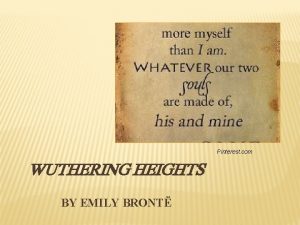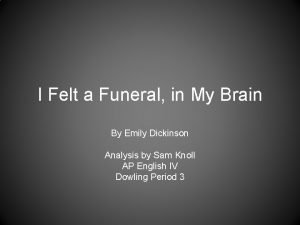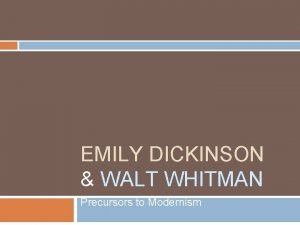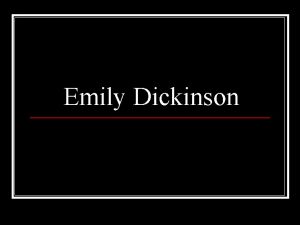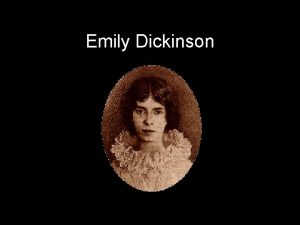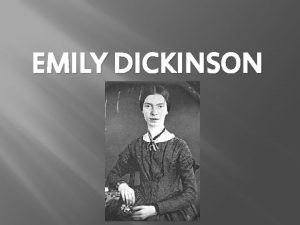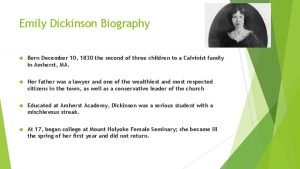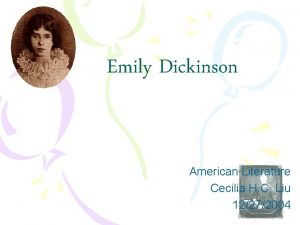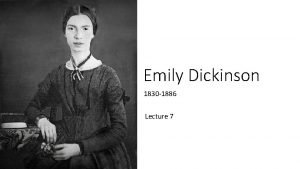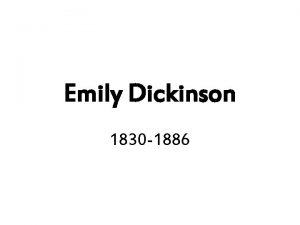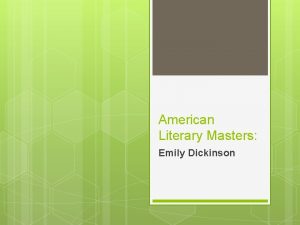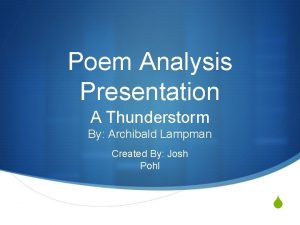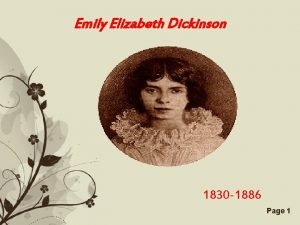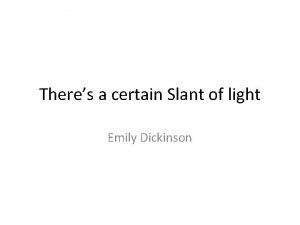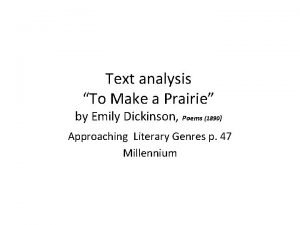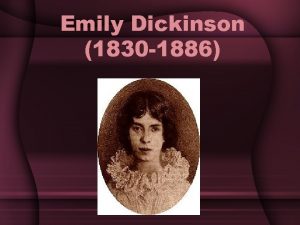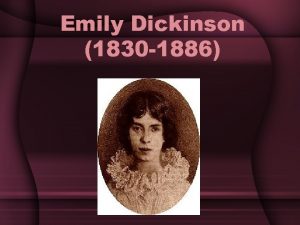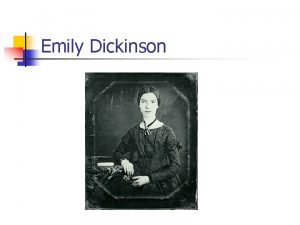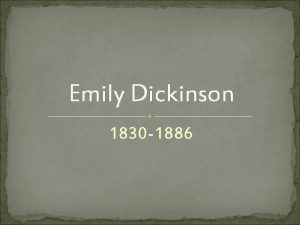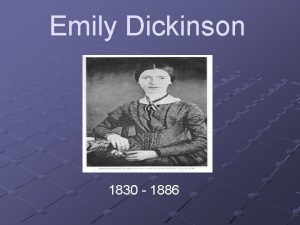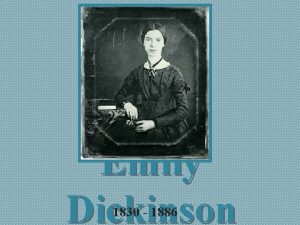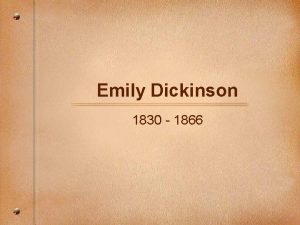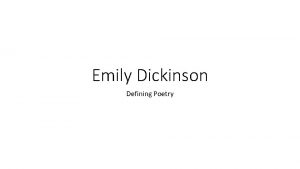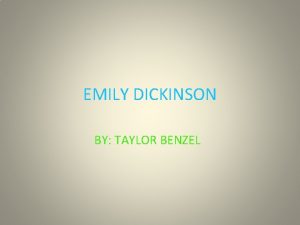Emily Dickinson 1830 1886 Poetry Emily Dickinson One


















- Slides: 18

Emily Dickinson 1830 – 1886 Poetry

Emily Dickinson • One of the most significant poets America produced in the period following the Civil Way • Virtually unknown during her lifetime • Born and resided in Amherst, MA • Eccentric and extremely shy • Later years dressed entirely in white • Later years ran to hide from visitors • Conversed with friends while sitting behind a nearly closed door

Dickinson’s Work • Regionalist – New England • Works signaled the beginning of modern American poetry • Challenged traditional attitudes about content and form • Altered traditional forms and thought • Experimented with language and form • Expressed her doubts, irreverence, bitterness, and even outright rebellion • Favorite subjects nature, love, death, and immortality • Saw the uncommon in even the most ordinary things.

Dickinson’s Work • Inspired by religious upbringing, which influenced her content and form. • Grew up singing hymns of Isaac Watts and adopted their meters for her own use. • Rebelled against God. • Verse reveals the modern attitudes of doubt and denial

After her death • Sister found many manuscripts of poetry and had them published • Because of her deviation from contemporary poetry, editors tried to “improve” it by regularizing it (1886 – 1896) • 1955 Thomas H. Johnson published the originals • She did not title her poems. All titles are editorial additions.

Prologue • Dickinson considered herself a nature poet • In poem, she says she writes what Nature tells her • Reveals her relationship with the world to be onesided • According to the Prologue, what’s the poet’s task?

I’m Nobody! Who Are You? • One of her most playful lyrics • Glories in being a “nobody” • How does this poem support the idea that a person’s desire for privacy or isolation is acceptable? • What simile does she use? What does it mean?

Success • Success is appreciated most by those who don’t succeed • In the same way a beverage tastes best when one is very thirsty • One who understands victory is the one who, as he dies, hears the sounds of triumph coming from his enemies; for he knows that neither now nor later will be ever be able to share in the glory of winning. • What’s the irony of this poem?

Aspiration • First stanza: It takes a crisis to reveal a man (old maxim) • We often surprise ourselves by being able to do something we thought we couldn’t do. • Second stanza: The heroic deeds of men in history would not have seemed so unusual if we hadn’t been in the habit of expecting so little of ourselves. • What’s the irony of this poem?

To Make a Prairie It Takes a Clover • Dickinson rarely left Amherst, but travelled greatly in her imagination • Poet combines nature and daydreaming • What does she mean when she says that a prairie can be created by reverie alone “if bees are few”?

Hope • Suggests hope is constant and unchanging in spite of the worst circumstances. • Hope is unselfish: it expects nothing in return for its cheering song. • What is the extended metaphor?

A Book • More use of imagination • Travel in a book • You don’t have to be rich to use this form of transportation. • Identify and explain the similes in this poem.

Simplicity • What qualities of life does Dickinson seem to value in this description of this happy stone? • What does she see as the purpose in the stone’s life?

She Sweeps with Many. Colored Brooms • Glimpse of nature • What are the possible interpretations? • Who is She? • The sun at sunset compared to a housewife, who is sweeping the floor. Brooms would be the streaks of color across the sky at sunset, and those streaks fade into stars as night approaches. • Housewife is the wind and the brooms are the colorful leaves she scatters.

The Snake • Recalls how as a barefoot child she would react to seeing a snake • Does her description seem true to life? • What does it look like to her? • How does she feel when she sees it?

Dickinson, Death, and God • Preoccupation with death likely stems from her rejection of Christ • Describes suffering and pain before death, and what family members go through after a loved one dies. • Grew up in a religious home, rejected Christ, then regretted it • “I have neglected the one thing needful when all were obtaining it, and I may never, never again pass through such a season as was granted us last winter. … I am not happy, and I regret that last term, when that golden opportunity was mine, that I did not give up and become a Christian. It is not now too late, so my friends tell me, so my offended conscience whispers, but it is hard for me to give up the world. ”

I Never Lost as Much but Twice • Refers to the death of two people she loved • She was a beggar asking God for comfort. • How was God a burglar? • How was God a banker? • How was God a Father? • How is she poor once more?

The Bustle in a House • Considers those left behind after a death • Is she referring to physical or emotional activity? • What is the metaphor in the second stanza? What’s the comparison?
 Emily dickinson (1830-1886)
Emily dickinson (1830-1886) Dickinson family tree
Dickinson family tree Emily dickinson funeral in my brain analysis
Emily dickinson funeral in my brain analysis Emily dickinson modernism
Emily dickinson modernism Emily dickinson facts
Emily dickinson facts Emily dickinson early life
Emily dickinson early life Emily dickinson childhood
Emily dickinson childhood Where was emily dickinson born
Where was emily dickinson born Emily norcross dickinson
Emily norcross dickinson I died for beauty
I died for beauty Emily dickinson's biography
Emily dickinson's biography When is success counted the sweetest
When is success counted the sweetest I heard a fly buzz when i died meaning
I heard a fly buzz when i died meaning Emily dickinson timeline
Emily dickinson timeline The thunderstorm poem
The thunderstorm poem Famous american poet
Famous american poet Emily dickinson ppt
Emily dickinson ppt Theres a certain slant of light meaning
Theres a certain slant of light meaning To make a prairie emily dickinson analysis
To make a prairie emily dickinson analysis

